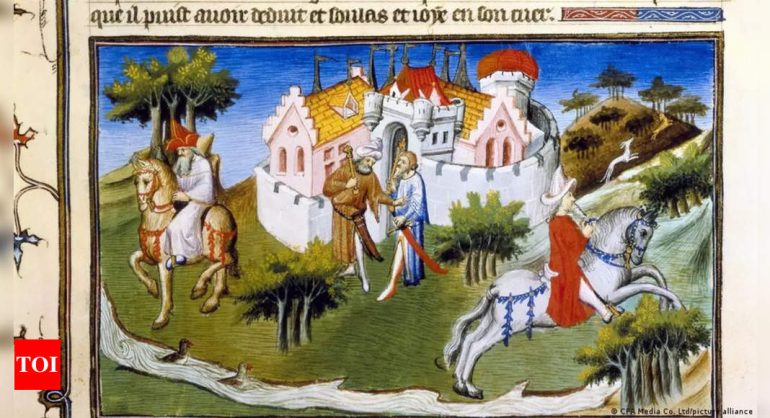Picture this: You’re 17 and have never left home. Your father and uncle, who have been excluded from you your entire life, make a trip back home before they set off once more on their second adventure. Just this moment, you join them. The journey will cover 15, 000 miles ( 24, 000 km ) and last 24 years. You’ll experience things you could n’t have imagined and be thrust into the sultan of a powerful empire. And, finally, you’ll become one of the most prominent travelers in European history. Nothing less than the history of Marco Polo may serve as the blueprint for a blockbuster film. Between 1271 and 1295, Polo spent 17 of those centuries in China as a popular figure in the flourishingMongol Empire under Kublai Khan, and was born in Venice. Polo and Rustichello da Pisa, both of whom had previously lived in Italy, created a travelogue to document his adventures. The resulting book,” Il Milione” ( The Million ), known in English as” The Travels of Marco Polo”, eventually became a medieval bestseller. Christopher Colombus is said to have carried a duplicate around because it was read by everyone who was educated, from monarchs to priests. An account that” shocked” EuropeansPolo was not the first European to visit feudal China, let alone the first person to file this. As early as the 9th and 10th centuries, Muslim tourists were documenting both land and sea excursions to China, according to Hyunhee Park, a professor of history at City University of New York. Polo was the first German to release information on China into the public consciousness at a time when Europe was closed and inward-looking, and his record did not live up to European standards. Polo described the Mongol Empire as a wonderful culture with excellent places, Park explained:” Some Europeans were shocked. According to Margaret Kim, a teacher of foreign language and writing at National Tsing Hua University in Taiwan, Polo’s information deviated from the standards used by other Westerners who reported on non-European land. ” Before and even after Marco Polo, European vacation authors, when they describe unusual places and foreign folks, they teach social classes and religious theory. That’s inherent in what they write. But Polo does n’t have that kind of sense of religious doctrine… He seems generally, in his information, engaged in scenery and traditions of different parts of the world. He’s a very liberal man “.Employing the’ Imperial Gaze’Polo’s see sets him apart from forthcoming European travel accounts, which were largely driven by a desire to conquer and a perspective of postcolonial supremacy. According to Zhang Longxi, distinguished professor at Yenching Academy of Peking University,” Marco was amazed by the wealth and power of the Mongol rulers at a time when the East was fabled to be rich and prosperous in comparison tomedieval Europe,” his attitude was very different from that of later European explorers and militant colonialists. He explained that in future descriptions of China, it would be called “backward” and” stagnant,” nothing near the grandeur of Europe In China, Polo became a well- respected figure in Khan’s court. While his exact position remains debated, there’s a broad consensus that he was a prominent civil servant with diplomatic responsibilities. He therefore looked at the Mongol Empire not as a foreigner, but as an insider. The most influential period of his life was spent in Asia, where Marco left Venice when he was a teenager. He developed a way of thinking about the world that cannot be described as being entirely Western there, explains Kim. He does, however, possess what I would refer to as an” Imperial gaze”… He thought that the world was divided between the world’s more or less developed people. So in Marco Polo’s world, you’re either very civilized, somewhat civilized, or savage “.And for him, as Kim points out, the greatest center of civilization was not the one Europeans expected, but rather: Kublai Khan’s Mongol Empire. Marco Polo’s numerous travels As a source of historical information, Polo has had his fair share of controversy, much of it based on complexities surrounding his book. There is no one authoritative manuscript, instead, some 140 different versions exist. A layer of uncertainty is added by Marco Polo’s co-writer Rustichello’s involvement in the book’s production and his potential impact on its content, which historians have not previously considered. Kim thinks that Rustichello is in charge of the book’s copying and distribution and that Polo is the author of the book is in charge of its content and style. Zhang, however, believes that while Polo was the source of information, Rustichello may have shaped the book’s content:” Rustichello, a romance writer, actually retold the stories from Marco, likely with added fantastic colors and details that would appeal to medieval readers”, he explained. However, the expert continued,” The Travels of Marco Polo” definitely exhibits restraint in terms of imaginary features in comparison to some other travelogue literature from that time. Some historians, including the renowned Sinologist Frances Wood, were also influenced by the absence of the expected information on China and a purported lack of corroborating sources, which raised questions about the validity of Polo’s observations. Even though Polo and Rustichello make it clear in their book’s prologue that they also include second-hand observations in their travelogue, historians still tend to disagree that Polo’s key observations are so original and specific that they could n’t have been made up or solely based on second-hand accounts. Scholars, including Park, have also found corroborating proof of Polo’s observations, including in primary documents coming from Chinese and Islamic sources, such as in the writings of Ibn Batutta, the celebrated 14th- century North African explorer. Marco Polo: A man for todayToday, 700 years after his death, Marco Polo remains remarkably well- known, even by non- scholars: an American swimming pool game, an upscale fashion company, numerous travel businesses, even the” Snapchat for boomers” all make use of his famous name. Beyond his brand, Etoo’s relevance extends far beyond his clout. Polo demonstrates that” the world contains things beyond our imagination of it in ways that may unsettle and disturb, but we can adapt to that.” So the’ Imperial Gaze ‘ is not the property of any culture or civilization. And it is undoubtedly not the West’s exclusive property.” As for Zhang, Polo serves as a reminder that non-biased cultural relations are possible in times of increased tensions between much of the West and China. It is a model of mutual understanding and cooperation, rather than]of] fierce rivalry and conflict”.












































